- Home
- Tim Winton
Scission Page 2
Scission Read online
Page 2
‘Pickin’ him up off the side of the road. He’s drunk like you. He’s hurt, you bloody idiot!’
Albie hated that man. He couldn’t remember seeing him before. He was not a farmer. Might have been a farm hand for someone he didn’t know. He didn’t care; he hated him. He wanted the man to see his son, and to weep like the son had wept out on the road with that hopeless starter motor sound in the dark.
His father shoved the man around to the back of the truck. Albie’s insteps were cold from pressing against the lamp. He watched through the grimy little back window. The man staggered up onto the tray and knelt with a thud beside the body under the tarp.
‘Little coward. Leave a man alone. Own father. Own father.’ The rider’s bloody face was immobile. The old man’s hands touched it, lifted the head off the truck tray. ‘And what’ve yer got to say for yerself? They bring yer back to me!’ The sound of the rider’s head being dropped onto the metal tray vibrated through the whole truck like the sound of a mallee root being tossed in. Again. Whump. The father beat his son’s head against the tray. Albie’s father looked helpless, did not move.
Albie got out. The flat bed of the truck resounded again. The jumble inside Albie pushed upward; he wanted to be sick. He snatched the Tilley lamp by the handle. He heard the startled voice of his father. He swung the lamp up and over, a bowling movement. Glass and sound and splintery light happened all at once and his father had hold of him as the drunk old man lay still on his son, stinking of beer and kerosene.
As they turned off the bitumen road into their own run of gravel to the yellow-lit house down in the valley, Albie ended the silence with a question. He was startled by his own toneless delivery.
‘Why did that man hit his son for getting hurt?’
His father sighed. He sounded relieved that the silence was finished. ‘I don’t know, boy.’
‘Would you do that to me?’
The truck slewed and stopped.
‘Lord, no. God A’mighty, no!’
‘He was going home,’ Albie said.
His father’s mouth moved. He reached out and put his knuckles to Albie’s cheek, left them there for a long time, as though still waiting for words to come. ‘Sorry about the salmon,’ he said at last, ‘I should’ve known better.’
The truck moved forward again. Albie felt those knuckles on his cheek still and knew, full to bursting, that that was how God would touch someone. He neither moved nor spoke, and the truck trundled on.
Getting Ahead
for Simon
IT WAS three years after Dad died that Mum started to get ideas, and it nearly drove the five of us mad. After dinner, when all the pots and plates were washed, dried, inspected and put away, and the smallies put to bed, Jilly and I would do our homework and Mum would get thinking. She was like a broody hen sitting there in the corner of the sofa on her clutch of ideas, keeping them warm. Dad was the one with all the ideas before that, but all of them were lousy. It took Mum a few nights to come up with hers, and without a word one evening she got up, wrote them on a Scott Towel and stuck them to the door of the fridge.
BE HEALTHY
BE ORGANIZED
BE CAREFUL
GET AHEAD
We were dumbfounded. No one in our home had done anything like that before. Soon afterwards, she went out and bought a Dymo labeller (all the rage then) with the savings in the Vegemite jar in the cupboard. And then things started to happen. Labels: warnings, reminders, instructions appeared on everything. WASH HANDS! said the cistern in the outhouse. SHUT DOOR! cried everything with hinges. On our bedheads, adhesive checklists appeared in our absence: who to pray for, duties to be done, cautionary notices. Mum began to develop powerful wrists from punching out those sticky messages. You could hear the grot-grot sound of the pistol-like gadget all over the house.
She was a big woman, my mother. In poor light she resembled an untidy stack of tea-chests. She rumbled about the house at night checking us in our beds, not sleeping herself until Mahoneys’ rooster started to crow. We always liked the Mahoneys despite the rooster. Mrs Mahoney had what Mum called ‘a generous bosom’; she was a good neighbour. Mum ironed and mended and we left her in bed when we got up for school in the mornings. She ironed and mended. And three years after the old man turned yellow and died, she got to thinking as well.
It wasn’t long before the chief subject of conversation became getting ahead. Jilly and I were old enough to understand and too young to contradict. (That was another thing she said.) One night when we were working on our books, Mum ruffled herself in the corner of the sofa, putting her upper teeth in, and said: ‘You’ve gotta get ahead.’ We stopped work and looked at her gazing into the fire. ‘You’ve got to find some way of getting ahead. You can’t stand still.’
She said this once or twice a night for a whole week. Jilly and I thought she was going mental. Only mental people and teachers repeated themselves like that. But at the end of the week she looked into the fire and said: ‘You know, kids, there’s only two things more I’d like to try out in this life,’ as if she’d done pretty well everything else; ‘First, I’d like to see how long I could live off a packet of Jatz and my own wits in the desert, and second, I’d like to be a landlady.’
‘I’d like to be a policeman,’ I said, relieved that she hadn’t gone mental after all.
‘I’d like to be blonde,’ Jilly said, holding out a lock of her carroty hair.
‘But I’m too old for the desert,’ Mum continued, as though we hadn’t spoken. ‘So, we’re gonna get into real estate.’
Jilly and I exchanged looks of deep disturbance.
‘We’ve got no money,’ I said.
‘We don’t need it. We got a house. It’s assets.’
Jilly wedged an elbow between my ribs. Mum took her teeth out and held them like they were a pair of specs and she was Julius Sumner Miller gazing into the fire and not our old Mum. ‘We’ll rent this place out.’
‘But Mum,’ I said hoarsely, ‘there’s six of us in it already.’ There was no way I could believe she was serious. It was a two bedroom state house. Not flash, not well-painted, not well-furnished, and as far as I was concerned, not available. Five of us, I thought, there’s Maxford (me), Jilly, Eddy, Edie and Millicent; the smallies in Mum’s room, Jilly and me in the other.
‘We’ll move into a flat.’
‘A flat!’ Jilly cried. Flats were where you got yelled at from balconies as you cut across the mangy lawns on your way to school. Flats were where ladies without husbands had to live. Flats had no backyards.
‘Just for a while,’ Mum said.
‘How long?’ I asked.
‘It’s just until we get ahead,’ she said.
The flat had a bedroom, a livingroom, a kitchen and a bathroom/toilet/laundry (most confusing for the smallies) and we loathed it. Mum calculated we’d be making fifteen dollars a week on top of her pension, and all the time that we lived like refugees sleeping on the floor of that flat, aching for garden space, cubby space, fences to vault, dogs and bobtails to tangle with, I kept that fifteen dollars in mind. Our tenant, the person who rented our house, was a senile old woman who smelt of cat-pee and was called Mrs Marsdale. It took her a long time to answer the ad in the paper. We chose her because she was the only one who did. We didn’t like her smell. Mum didn’t care for her name. Millicent cried when we moved out.
‘It’s only till we get ahead,’ Mum would say, as if to convince herself too. ‘We’re saving, we’re saving.’ It used to be a lullaby for the smallies, long, low, sweet.
But it was lousy in the flat. We didn’t open the door to anyone except Mum in case the Health Inspector got onto us for overcrowding or the landlord saw Mum’s Dymo labels all over the place, like PRESS HARD TWICE in the toilet, and MUMMY LOVES YOU policing the pantry door. The fridge had become scarfaced and confounding as Mum’s old and new messages to us and herself and God (she had started praying in Dymo which, I suppose, is like doing it in tongues) accumula
ted day by day. We survived like this for months, clattering along balconies, passing our old place on the way to school for a look at how run-down the garden had become, at how many cats seemed to congregate on the verandah now, and coming home each afternoon to see our Mum knitting by the smelly kero heater with her teeth out trying not to look disgusted about being a landlady getting ahead.
The rent never seemed to arrive. One evening when all the others – even Jilly – were asleep on their mattresses on the floor, Mum sat beside me at the table where I was skirmishing with algebra, trying for the teacher’s sake to pretend that x was the number 2 in disguise, and said:
‘Will you come with me to the house tomorrow, after school?’ There was a weighty tone in her voice, the kind that grown-ups reserved for other grown-ups.
‘Course,’ I said lumpily. ‘What’s up?’
‘Oh,’ she murmured, ‘tenant problems.’
‘Oh,’ I replied, as if it was all too clear and much too commonplace.
Mrs Marsdale didn’t seem to resent our inspection of the house. We exchanged good days and how-do-you-dos; she didn’t seem to mind at all. In fact, I’m not even sure if she was really aware of our being there. She seemed to be in a kind of crooning, half-animated coma. She fell over bits of furniture as she spoke to them. She scratched herself. She scared me witless.
The house was a disappointment. The sofa looked as though someone had taken to it with a rasp. The floor was mulched with Kitty Litter, wet newspapers and wads of phlegmy cotton. Stacks of newspapers and magazines threatened to fall from every corner. Shopping trollies, bicycle wheels, steel buckets, a NO PARKING sign. And no sign of the three months’ rent Mum had come to collect.
‘Mrs Marsdale,’ I heard my mother say as I discreetly picked a piece of blue meat from between my toes. ‘Mrs Marsdale, I . . .’
I caught sight of her looking up at the ceiling where ugly brown stains had appeared in our absence. ‘Mrs Marsdale, is the roof leaking?’ Mrs Marsdale continued her ecstasy of falling and muttering. ‘Maxford,’ Mum said, ‘get the ladder.’
I went out to the shed for the ladder as Mum tried to hail Mrs Marsdale. When we got up into the ceiling, we found a colony of wild-eyed cats hissing at us from the farthest corners of the darkness. I heard a glottal exclamation from my Mum. She dragged me down the ladder and out the front door.
‘There’s worse than that,’ she said as we walked home. She looked shocked and grey. ‘I have reason to believe that our outhouse hasn’t been used since Mrs . . . since our tenant moved in.’
‘But Mum . . .’
‘A woman can tell things about a bathtub the likes of a clean boy like you would never understand. It’s because the toilet is a long way up the backyard. It’s a long way, I’ll grant it, but there’s limits to what your mother’ll tolerate, Maxford.’
‘It’s the most exasperating thing,’ she said that night as the smallies brawled from one end of the room to the other with a frisbee. ‘I can’t understand the ways of some people. It’s not right. Oh, oh . . .’ And in the midst of that tiny battleground of mattresses and rioting bodies, I thought she was going to cry. The cracking, sliding look on her face lasted a full five seconds before she said: ‘Well, I’ll just have to appeal to her sense of decency.’ The world was a stable place again; the Laws still held. Our Mum did not cry.
In the calm after tea, by the smelly heater, Jilly and I watched her punch out an honest, forthright letter on the Dymo, a long blue strip that coiled at her feet: grot-grot, grot-grot, grot-grot. She was still at it when we flopped on our mattress and went to sleep.
‘. . . just until we get ahead . . .’ I heard her murmur as I dropped off.
The long, blue, adhesive salutation Mum stuck to the front door seemed to go unheeded. Mum went round during the day, just to watch the cats from the footpath and to think. In the flat she muttered and scowled and thumped the kitchen sink.
‘Then it’s persuasion,’ she murmured late in the evening, polishing her teeth with cotton buds by the heater. I was hard at work with my algebra and paid no attention.
So, walking in the warm dark towards our old house the next night, I had no idea what it was we were doing.
Dogs barked all over the suburb. A few sprinklers tinkled. There was no light on at our place and none in the neighbours’ either. It was very late. I followed the jumbling shape of my Mum up the side of the house and out to the back shed. She gave me a shovel.
‘Dig,’ she whispered.
‘Where?’
‘Anywhere.’
I dug, on my knees in the dewy grass. She kept watch. There was no light and no noise from the house. On the back verandah, cats watched us, starlight catching in their eyes. I dug deep, narrow holes. Four of them. Then suddenly we left. I was put to bed.
Next day after school, Mum had four potted saplings standing on the sink. She was acting most peculiar, drinking tea, humming. ‘My investments,’ she called them. That night she got me out of bed at midnight. We walked across to our old place again, only this time I carried two potted saplings and a bellyful of dread. Again, no lights, no signs of wakefulness from inside. Our holes were still there with their gentle mounds of sand.
‘Get the big spanner from the shed,’ she whispered. I did. ‘Now,’ she hissed, ‘catch cats.’ And then I knew.
I slunk across the yard. ‘Puss-puss-puss.’ A black cat appeared from the darkness, slowly coming to my call. It spat and scratched when I grabbed it by the scruff of the neck and delivered it to Mum. She hit it on the head with the big spanner and dropped it into the nearest hole.
‘One down,’ she said. Needlessly, I thought. I went back to kitty-kittying, thinking: so this is persuasion. Cats came slower and slower as time passed, but the darkness continued to yield them up all the same. Mum bedded each hole with four or five cats and planted a sapling in each, squashing down the soil around them with her boots. All except the fourth. She wanted to be sure we got every single cat. I prowled up and down, tired now, and feeling wretched about the cats. After a while it was obvious that there were no more. It was at that moment that a sound behind me caused me to go rocky with fright. I saw Mum’s jaw, long and white, down in the dark. She looked shocked.
‘Psst!’
I could not move. I was certain the blood had halted in my veins. I heard the clack of Mum’s upper plate. With great effort, I turned to face the noise. Mum turned too. There were the big white arms of Mrs Mahoney on the fence. Our neighbour, Mrs Mahoney. She was looking at us very carefully. Her eyes seemed to glow in the dark. My head was pregnant with the consequences of being caught in the act. Mrs Mahoney lifted a finger and motioned for us to come closer. We inched forward. I saw her eyes clearly. They were no-nonsense eyes. She pointed them at my Mum. I wanted to cry.
‘Yes?’ my poor Mum said.
‘There’s one under the woodpile.’
All the way home in the dark an hour later, Mum sang hymns and kicked stones in a clatter down the street as if nothing in the world could be a danger or a problem. It was as though she had gotten drunk on Mrs Mahoney’s cup of tea. Mrs Mahoney had told us of Mrs Marsdale’s disappearance. ‘Two days she’s bin gone. Ever since you came round for the rent. Left the cats and all.’ The fact that Mrs Marsdale had gone without paying didn’t worry Mum on that warm, dead-of-night walk home. The state of our old house, the brown cat-piddle ceilings, the gutless furniture, the filth didn’t bother her. The fact that we were not ahead was no burden to bear. The house was empty. We were moving home. Mrs Mahoney was a sport.
‘And we’ve got ahead, really,’ she said. ‘We’ve got four new trees.’ Which was true. And still is. They’re the best thing about the place. Ask my kids.
My Father’s Axe
1
JUST now I discover the axe gone. I look everywhere inside and outside the house, front and back, but it is gone. It has been on my front verandah since the new truckload of wood arrived and was dumped so intelligently over my front la
wn. Jamie says he doesn’t know where the axe is and I believe him; he won’t chop wood any more. Elaine hasn’t seen it; it’s men’s business, she says. No, it’s not anywhere. But who would steal an axe in this neighbourhood, this street where I grew up and have lived much of my life? No one steals on this street. Not an axe.
It is my father’s axe.
I used to watch him chop with it when we drove the old Morris and the trailer outside the town limits to gather firewood. He would tie a thick, short stick to the end of forty feet of rope and swing it about his head like a lasso and the sound it made was the whoop! of the headmaster’s cane you heard when you walked past his office. My father sent the piece of wood high into the crown of a dead sheoak and when it snarled in the stark, grey limbs he would wrap the rope around his waist and then around his big freckled arms, and he would pass me his grey hat with bound hands and tell me to stand right back near the Morris with my mother who poured tea from a Thermos flask. And he pulled. I heard his body grunt and saw his red arms whiten, and the tree’s crown quivered and rocked and he added to the motion, tugging, jerking, gasping until the whole bush cracked open and birds burst from all the trees around and the dead, grey crown of the sheoak teetered and toppled to the earth, chased by a shower of twigs and bark. My mother and I cheered and my father ambled over, arms glistening, to drink the tea that tasted faintly of coffee and the rubber seal of the Thermos. Rested, he would then dismember the brittle tree with graceful swings of his axe and later I would work with him on the bow saw and have my knees showered with white, pulpy dust.
He could swing an axe, my father.
And that axe is gone.
He taught me how to split wood though I could never do it like him, those long, rhythmic, semi-circular movements like a ballet dancer’s warm-up; I’m a left-hander, a mollydooker he called me, and I chop in short, jabby strokes which do the job but are somehow less graceful.

 An Open Swimmer
An Open Swimmer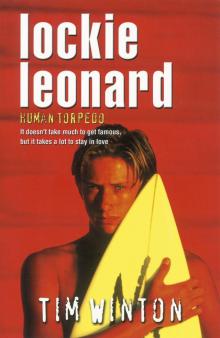 Human Torpedo
Human Torpedo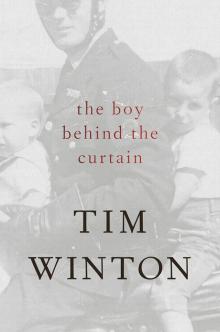 The Boy Behind the Curtain
The Boy Behind the Curtain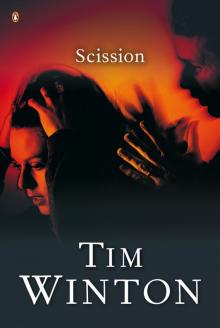 Scission
Scission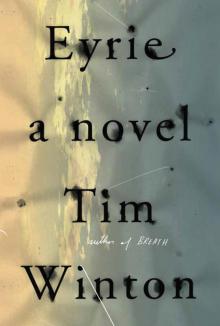 Eyrie
Eyrie Island Home
Island Home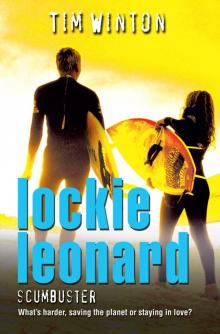 Scumbuster
Scumbuster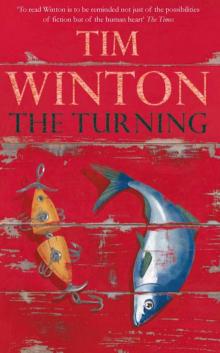 The Turning
The Turning Legend
Legend Blueback
Blueback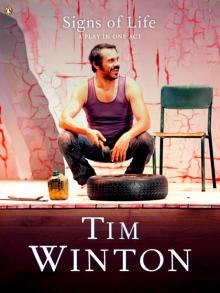 Signs of Life
Signs of Life Breath
Breath Land's Edge
Land's Edge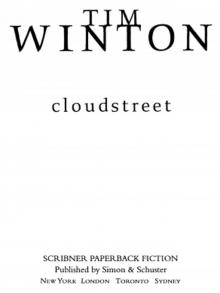 Cloudstreet
Cloudstreet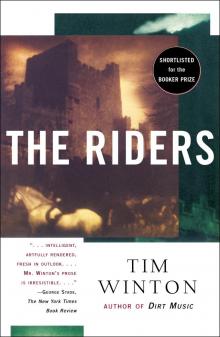 The Riders
The Riders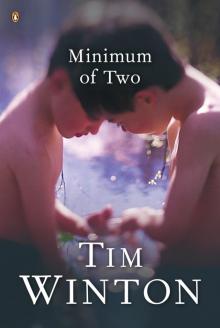 Minimum of Two
Minimum of Two Shallows
Shallows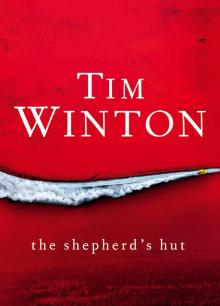 The Shepherd's Hut
The Shepherd's Hut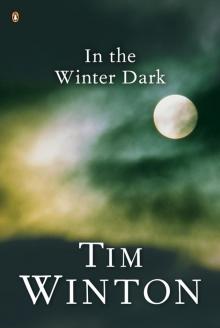 In the Winter Dark
In the Winter Dark